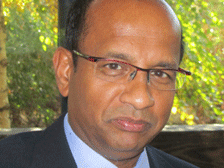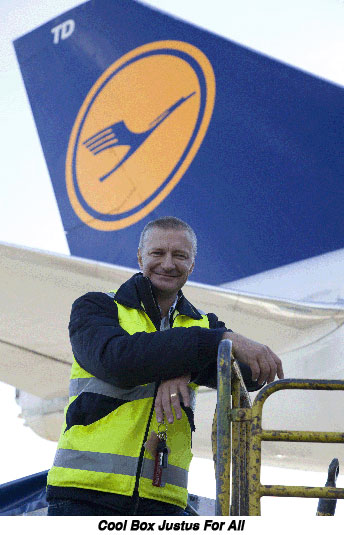Joe Lawrence Keeps It Simple & Direct

You ask Joseph D. K. Lawrence,
President of Airline Services Inc., (ASI), a simple question such as,
“Why did you hire John Ryan, the likeable, iconic air cargo sales
and marketing guy who helped put Virgin (Airways) Cargo in business
in the USA?” and amazingly, in this hyper-complicated world of
2011, Joe keeps the answer simple, straight and direct.
“We have the network, the experience
and plenty good reason for airlines and others to choose our services.
“John closes the circle and will
bring ASI to a new level of recognition in the USA.”
It’s no secret that the change after
the financial crises benefitted Canadian banks, which on the whole appeared
to be in better shape and able to leverage their strength to expand
into the U.S. (TD Bank is a good example).
But perhaps what was lesser known was
the opportunity enjoyed by ASI—a stable, growing, Canadian-based
air cargo company—after both the financial crises and heightened
U.S. security demands.
Airline Services Inc., with a broad client list across Canada (including
giant UPS) has actually been a recognized cargo GSA since 1989.
“We were established in Ontario,
Canada,” Joe Lawrence said, adding, “and have expanded our
coverage to include Quebec, Alberta, British Columbia, Manitoba and
the Maritimes.
“Our service expansion in the USA
commenced in 2004 with our U.S.A. head office located in New York.
“Since the expansion, our service
coverage has grown to include California, Texas, Illinois, Florida and
Washington, DC.
“ASI represents large international,
regional and national airlines and we currently have a customer database
of over 700 forwarders and agents.”
|

“My view is that there will
be greater security demand ahead and continued uncertainty as
to what will happen next." |
Airline Services has its principal office
located in Mississauga, Ontario with regional offices in Quebec, British
Columbia and Alberta.
“Head office in Mississauga covers
Ontario, Manitoba and East Coast Provinces while the Montreal office
covers operations in Ottawa and the rest of the province of Quebec.
“ASI's presence in Vancouver in
Western Canada is further strengthened by its office in Alberta, which
coordinates all cargo sales and marketing activities with the regional
office in Vancouver.”
We learned the company has further expanded
recently by developing partnerships for a growing service package to
the India subcontinent and also far-east markets.
Joe Lawrence began his aviation career
at Wardair, which he still describes as “Canada’s finest.”
Lawrence spent 12 years as Wardair chief
of sales and marketing.
“When Max Ward decided to sell his
company to Canadian Airlines, I simply thought it was time to move on
rather than be part of a bigger airline.
“I went into the GSA business having
learned the ropes at Wardair.
“Part of my job there included responsibility
for appointing GSAs.
“So I had learned the GSA business
fairly well-or at least I thought I knew what it takes to be a good
GSA from the inside out.
“The big surprise when I landed
on the outside of the airline, that actually surprises me even today,
is how reluctant, even resistant, some companies are to change.
“A big part of our job is to convince
people how much money can be redirected to the bottom line by going
with a capable, strong and engaged GSA like Airline Services Inc.
“We understand both sides of the
business.
“Many of our people, myself as mentioned
and John Ryan, plus other team members of ASI, have been on the front
lines of the airline and the freight side of the business.
“We know what needs to get done
and we make it happen.
“Our success is connected to honesty,
integrity, being straight forward, keeping it simple and, above all,
letting everyone know what to expect.”
Joe Lawrence hails from Sri Lanka.
He left the country in 1975 to seek his
fortune in the new world, eventually landing in Canada.
With the aforementioned expansion to India
(Bombay & Mumbai, where pharma is booming) ASI has also moved to
Sri Lanka, but Joe is quick to point out that “they came looking
for us.”
Joe also says the future of his former
homeland “hinges on stable government that in turn will attract
investment.
“Today, a fair amount of clothing
is manufactured in Sri Lanka and business in tea, rubber, semi-precious
stones, spices and handicrafts keeps things moving from there.”
But it has not always been beer, skittles
and good times for Joe Lawrence. He admits the financial crises had
a negative impact.
“The year 2009 was the toughest
for us.
“There have been other crises, but
2009 was the worst.
“Last year was much better and 2011
feels better still as business and economies all around are picking
up again.
“From a Canadian perspective, our
economy has been much stronger than the U.S. all along.
“Our banks were not exposed to the
losses suffered in the U.S. and today even Canadian banks are quite
strong as compared to many in the U.S.A.
“The Canadian real estate market
also has been strong as a backbone to the overall economy.
Perhaps one indication of just how good
an organization ASI was and continues to be is that the company has
served as GSA for United Parcel Services (UPS) in Canada for the past
19 consecutive years.
“From an airline and air cargo perspective,
UPS is always ahead in terms of technology and process.
“UPS continually refines and upgrades
to conform to rules and regulations.
“UPS is very demanding, but that
keeps us on our toes.
“The core business of UPS in Canada
is small package, which requires a special brand of commitment and attention
all around.”
Looking ahead, Joe Lawrence sees plenty
of room to grow.
“Our focus is to provide the customer
a single source, one-stop menu of services to every nook and cranny
of the world.”
Taking the industry view, Joe Lawrence
has some ideas.
“The entire process of how we do
business is changing, especially from, say, the TSA view.
“Security challenges every aspect
and part of air cargo and affects everybody.
“These challenges are especially
difficult because security demands are also roadblocks to doing business.
“My view is that there will be greater
security demand ahead and continued uncertainty as to what will happen
next.
“Once upon a time we could truck
cargo out of Canada to the U.S.A. and put it on any aircraft, either
passenger or freighter.
“Today I cannot do that unless we
meet all the TSA requirements.
“The result is that costs skyrocket,
creating big downward pressure on the bottom line.
“Another result of the continued
downward cost pressure of security is that international airlines and
shippers are looking for alternatives including, for example, Air Canada,
which has increased its direct flights to some destinations, including
Latin America, bypassing Miami.
“Part of the problem is as plain
as trucking air cargo to Canada via Buffalo, New York or Detroit, Michigan—two
heavily trafficked crossing points between the two countries.
“It seems no matter where you cross
the border, the local U.S. Customs office will have not only the rules,
but also their own interpretation of how rules are implemented.
“That situation, by the way, was
going on before TSA and mandates and has only gotten worse since last
summer’s 100% screening demand.”
About efreight:
“Our business still generates too
much paper.
“The problem is that countries’
and companies’ methodology varies greatly, so demand for providing
paper freight continues.
“At the end of the day, lack of
widespread agreement on common systems impedes accelerating paperless
cargo.
“For example, recently we had some
cargo moving via Miami to Central and South America, but the demand
from the carriers on one side was for original documents and manifests,
which should not be an issue in a paperless environment.
“So while we keep talking about
these things, as long as everyone has a different mandate to fulfill,
there is doubt paperless cargo can ever be achieved.
“IATA, which started out strong
for efreight, seems to have lost its focus, as the case has not been
effectively made advancing the virtues and the value of paperless cargo.
“If IATA is supposed to be the governing
body of the airline business, we can only wonder why it has not implemented
benchmarks for paperless cargo?”
Joe Lawrence states that during 2011,
he will hit the air cargo trade show trail, attending events in various
parts of the world.
“Building workable change that benefits
everyone begins with plenty of getting-to-know-you face time,”
Joe Lawrence says.
e-mail: joe@asi.com
Geoffrey/Flossie
|




